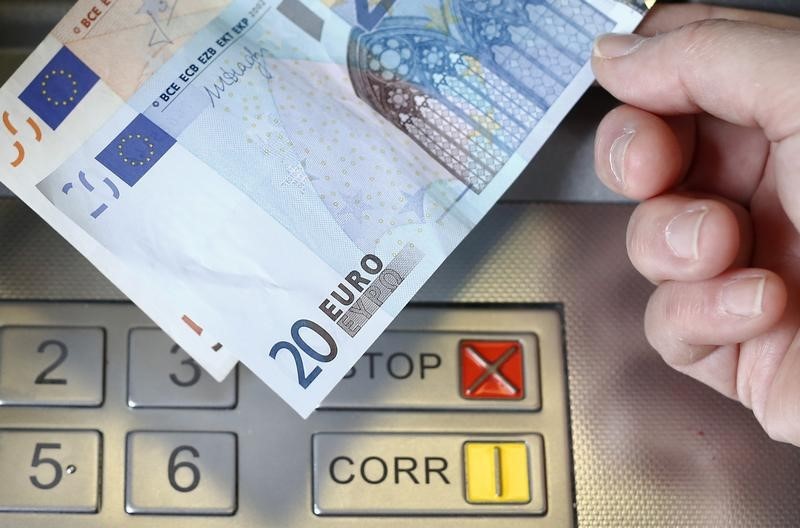By Jamie McGeever
LONDON (Reuters) - In an attack on Germany, U.S. President Donald Trump's top trade adviser said the euro was "grossly undervalued", a charge which may ring true for the German economy but not for the 19-member currency zone as a whole.
The adviser, Peter Navarro, said Germany, the euro zone's economic powerhouse, was exploiting the euro exchange rate for trade purposes, a charge rejected by German Chancellor Angela Merkel.
There's no clear method of establishing how much a currency is under or overvalued but many economists think that some economic measures show the German economy could easily cope with a stronger euro. It hit a 14-year low of $1.0339
Even German Finance Minister Wolfgang Schaeuble said on Friday the single currency could be a bit stronger for Germany.
But he agreed with economists that this would make life hard for other euro members. For weaker economies such as Greece, economic measures show the exchange rate is too strong, and for the whole currency area it is only moderately underpriced.
"The euro is below most estimates of fair value. And German exporters appear to be benefiting more than most," said Jennifer McKeown at Capital Economics.
The White House is concerned about the exchange rate because German companies sell cars, vehicle parts, pharmaceuticals, planes and helicopters around the world, competing with American, as well as other European, manufacturers.
Exports account for nearly half Germany's economic output, with 9.5 percent going to the United States and around 35 percent to euro zone countries.
In 2015, the United States became the top destination for German exports, overtaking France for the first time since 1961 due to an upturn in the U.S. economy but also due to the weaker euro. The currency has lost more than 20 percent of its value against the U.S. dollar since mid 2014.
WIDE DIVERGENCE
A handful of recent reports found that while the euro was undervalued for Germany it was too strong for other countries.
The World Price Index (WPI) published by research firm World Economics each month found that the euro was undervalued on a purchasing power parity basis, a measure that takes into account what money can buy in two different currencies based on inflation and the cost of living.
A "German euro" was nearly 17 percent undervalued against the dollar in PPP terms, while a "French euro" was overvalued by nearly 5 percent. A "Greek euro" was overvalued by 7 percent.
"German exporters remain the beneficiaries of a system that is causing stagnation and unemployment in the rest of Europe," World Economics said in the report.
The International Monetary Fund also said last year that the euro was undervalued by anywhere from 0 to 10 percent for the region as a whole.
But for Germany that undervaluation was anywhere between 10 and 20 percent, making it the most undervalued exchange rate for any of the 29 countries and jurisdictions around the world covered in the report.
ECB DECISIONS
One of the main goals of European monetary union in 1999 was increased economic integration and convergence between member states.
But it handed the decision-making on interest rates and currency policy to the European Central Bank, meaning that euro zone members could not longer individually use those tools to make themselves more competitive.
The latest weakness in the euro has been largely driven by the divergence between U.S. and euro zone monetary policy, and bond yields. The U.S. Federal Reserve is raising interest rates, while the ECB is pumping hundreds of billions of euros stimulus into the economy through quantitative easing.
The ECB has adopted an ultra-loose monetary policy in order to ward off deflation, strengthen the region's fragile banking sector and reflate the economy. That has led to a weakening currency, which benefits euro zone countries' exports.
Navarro told the Financial Times on Tuesday that Germany "continues to exploit other countries in the EU as well as the U.S. with an 'implicit Deutsche Mark' that is grossly undervalued."
The comments drew a rebuff from Merkel, who said Germany cannot influence the exchange rate.
"Germany is a country that has always called for the European Central Bank to pursue an independent policy, just as the Bundesbank did that before the euro existed," she said.
"Because of that we will not influence the behavior of the ECB. And as a result, I cannot and do not want to change the situation as it is."
Nevertheless, the European Commission's latest figures up to the second quarter of last year show that Germany has experienced a deprecation of the real exchange rate -- how much the goods and services in the domestic country can be exchanged for the goods and services in another country -- of around 7.5 percent within the bloc since the euro's inception in 1999.

That gives it a major competitive gain. Most members have experienced an effective currency appreciation, some such as Slovakia a virtual doubling of their exchange rate.